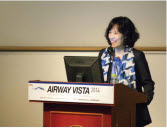- CBNU alumna, Professor Park Jin-ah

● Since your tenure track position in March, you must have been doing many things. What are you doing nowadays?
These days, I’m spending most of my time writing manuscripts and grant proposals. Mentoring trainees is a big part of my job, as well. In our department, a newly appointed junior faculty is not obligated to teach for the first three years. So I don’t have classes to teach yet, but I supervise trainees, including a Ph.D. student and post-doctoral fellows, in my lab.
● What was your motivation to study diseases of the respiratory system, like asthma?
I started my first year of Ph.D. training in 2001, in the Department of Toxicology at North Carolina State University. During a one-year rotation period, I had the opportunity to work in multiple labs. I took my second rotation in the lab of Dr. Kenneth Adler and decided to join his lab because his research focusing on lung biology intrigued me. The lung is a unique organ because it is located inside the body but is constantly exposed to the external environment. And the airway epithelium in the lung is the first line of defense against environmental insults. I started doing asthma research when I started my postdoctoral training. Since then, my research has focused on the role of airway epithelial cells in the lung in a context of asthma. Asthma is a progressive lung disease that affects 10 to 20% of the global population and results in direct and indirect costs of over 20 billion dollars a year, but the cause of asthma is unknown. My ultimate goal is to contribute to finding a cure for asthma.
● After getting your master’s degree at CBNU, you went abroad to study. Living in a strange place, did you have any embarrassing or unforgettable experiences?
For my first five years in the United States, I lived in Raleigh, North Carolina. To be honest with you, I didn’t feel that I was alone in a strange place. I have more heartwarming than unpleasant or embarrassing memories. I was extremely fortunate to meet good friends who started their Ph.D. training with me in the same year. One of my friends even threw me a huge birthday party in her house to celebrate my first birthday in the United States.
Also, I took a unique approach to breaking the ice, using Korean food. I’m always proud to say how great Korean food is — especially kimchi, which the New York Times selected as one of the ten healthiest foods in the world. So a couple of weeks after school started, I invited my friends over to my house and cooked Korean food and taught them how to make Korean pancake (jeon) and ddeokboki. My friends really enjoyed Korean food and even made it for me when I was sick. I admit that it was not always easy to live in a totally different environment, but good people around me helped me to get through.
● You are one of the legendary CBNU alumni these days. However, you probably confronted many obstacles along the way, like prejudices that some people have about foreigners. How did you overcome those difficulties?
Language has definitely been a challenge for me even now. However, believe it or not, I have not experienced many other obstacles. Looking back, I wasn’t shy and didn’t hesitate to ask for help. I wasn’t embarrassed to be seen for who I am. So my friends always tried to help me whenever I confronted any troubles.
If you’re asking about any disadvantage I might have had because I graduated from CBNU, which isn’t a top school in Korea, my answer is that I was never evaluated by the school I went to in Korea, only by how good I am now.
● The young generation in Korea tends to give up their dreams easily and avoid adventures due to practical problems. To them, your story would be a hopeful one. Do you have any advice for CBNU students?
First, be confident in yourself and be honest. Second, identify your strengths and weaknesses. That is the key to success. Be humble enough to seek help in order to change those weaknesses into strengths. Third, find good mentors. Remember that hard work is the first step to success, and that your future can be brighter than your past if you try your best.
Up until now, she has accepted her weaknesses and made up for them again and again. This habit is probably one of the main things which leads her to achieve her dreams. Even though you are not perfect now, don’t be shy, but go ahead. Then, you will find a proud part of yourself in the end, like her!

